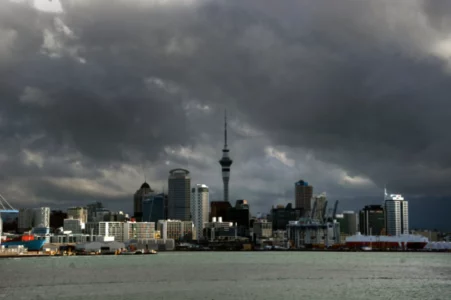
Auckland Emergency Management (AEM) is warning people that Cyclone Gabrielle “has more in store” and to be ready to move if they need to.
AEM deputy controller Rachel Kelleher says the storm’s impacts are expected to get worse before they get better and she reminds the public to be ready to self-evacuate if necessary.
“We’re certainly not out of the woods yet,” Kelleher says.
“I can’t stress this enough. Please have a plan to leave if you see water levels rising around you.
“Do not wait to be told to leave if you think you’re in danger.”
The MetService is advising rain is expected to increase this afternoon and overnight, with up to 200mm expected in some localised areas.
Strong winds and severe south-west gales are expected on Tuesday this week, bringing a risk of power outages across the region.
Storm surge is possible in the early hours of Tuesday, particularly around high tide at 2am.
People are asked to stay away from the coast.
Those living in low-lying coastal areas are urged to consider staying elsewhere overnight.
Kelleher says Civil Defence centres, shelters, and community-led sites have been receiving people who have not been able to stay in their homes or with friends and family.
“While demand for these services since last night has been low, we’ll continue to maintain these sites through today and overnight to ensure they’re ready for anyone who needs them.”
Auckland City Mission is providing shelter for people experiencing homelessness, and there are a range of people working together to make sure everyone has access to a warm, dry place to shelter through the storm.
Auckland Transport (AT) continues to advise people to avoid non-urgent travel.
Essential workers, such as healthcare workers, are asked to take advice from their employer.
Health services in the metropolitan Auckland area are running as normal, and people should attend appointments unless they are advised otherwise.
Kelleher reminds everyone to avoid putting further flood-damaged items or rubbish bins out on the kerbside for collection on Monday or Tuesday this week.
“These can become hazardous during periods of heavy rain and winds, and collections have been postponed for today and tomorrow.
“If you see your neighbours putting their bins out, please let them know too.”
AT has asked people to stay home today and tomorrow and avoid non-urgent travel.
Traffic volumes today have been at about half the usual levels.
KiwiRail has suspended all passenger train services in Auckland until at least midday Tuesday, with some rail replacement buses in operation.
Scheduled bus services are running today, but there will be some delays, detours and cancellations across the network depending on the impact of the cyclone.
People are advised to check for updates on road closures, including for the Harbour Bridge which may close again in high winds.
If it closes again, there’s information about detours on the AT weather watch webpage.
Ferry services are disrupted by current weather conditions, with some cancellations in place.
All ferry services will be finishing early tonight, the last ferry to Devonport will depart Downtown at 5pm.
Please avoid unnecessary travel, avoid driving on coastal roads, and check the AT website for the latest travel information if you must travel.
The NZ Defence Force has been working closely with other agencies to prepare for and respond to the impacts of the cyclone.
There are about 150 personnel and mix of vehicle types positioned across the Northland, Auckland, Hawkes Bay and Bay of Plenty areas.
Over the past week Defence Force personnel have been out in Auckland communities helping remove flood-damaged items from the streets, as well as helping set up the Civil Defence centres and shelters across Auckland, delivering more than 50 pallets of emergency supplies including blankets, mattresses, sleeping bags and warm clothes.
If your property is at risk of flooding, consider staying with friends or family tonight, or make a plan to evacuate if you see floodwaters rising.
Have a grab bag ready with clothing, medication, documents and ID, important items for the children or babies.
Those sheltering at home should make sure they have alternative power supplies; lamps, torches and batteries; a radio; a camp stove or BBQ.
Remember to keep your phones charged and use a car charger (and radio) if you need to.
Make sure you have supplies of prescription medication to get you through next week, c
Contact your GP if you’re concerned about health issues, and if you rely on electricity for medical devices, stay in touch with your health provider and your electricity provider and arrange a back-up power supply or contingency plan.
Phone 111 in an emergency or if someone’s life is at risk.
Preparing for power outages
Vector has advised that at 1pm, 12,000 homes and businesses are without power across the region, mostly in communities north of Orewa.
Teams have been putting in a huge effort to restore power, and this will continue throughout today and into tomorrow as the worst of the weather is due to hit the region later today.
AEM has published advice on preparing for and coping through a power outage:
- Keep torches, batteries, campstove or BBQ nearby. Take care with candles to prevent fire risk.
- Don’t use unsafe ways to heat your home, never use outdoor gas heaters indoors.
- Think about visiting neighbours, friends and family that might need help.
- Listen to the radio for up-to-date news (you can listen in your car or on your phone, but it’s a good idea to conserve your phone battery).
- You can drop into community hubs to charge your phone and have a hot drink.
- Take care with food from your fridge and freezer to avoid food poisoning.
Many insurers cover food spoilage from a power outage, and may also cover temporary accommodation if you can’t stay at home. Check your policy or phone your insurer.
Stay clear of fallen power lines and damaged electrical equipment.










